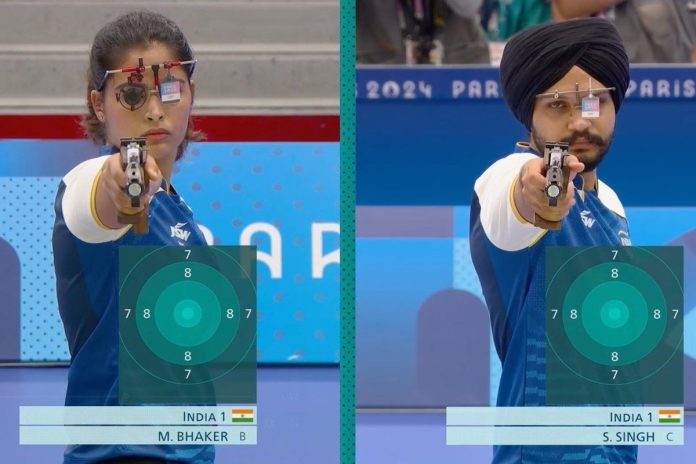Paris Olympics: “No time to celebrate. My work is unfinished. There’s a lot to play for,” Manu Bhaker said after winning her first Olympic medal on Sunday. Indeed, much more was at stake, including a place in history. The belief that success was near shone in her eyes and was evident in her determined smile.
Manu was eager for another medal, and she secured it on Tuesday: a second bronze, making her the first Indian since Independence to win two medals at the same Olympic Games. Norman Pritchard, a sprinter born in 1875 in Calcutta, had won two silver medals in the 1900 Games, also held in Paris. However, that achievement, recorded 124 years ago, is a lesser-known part of India’s Olympic history. While the IOC lists him as an Indian, World Athletics credits his medals to Britain.
Manu’s second bronze came alongside fellow 22-year-old and first-time Olympian Sarabjot Singh in the 10m air pistol mixed team event. For Manu, this was a reward for her self-belief during tough times. It was the “karma thing” she often spoke about: “Do your work—the hard yards—and the result will come,” she reiterated on Tuesday.
The two medals are sinking in, but Manu is keeping her emotions in check as she still has one event left. With two medals already in hand, a third now seems possible. The 25m pistol individual is her specialty.
In the mixed event for bronze, Manu showed her form. She appeared composed, setting up her station 30 minutes before the competition. After some shadow shooting and deep breathing, she returned ready and focused. Sarabjot, though nervous, hid it well.
Our shooters continue to make us proud!
— Narendra Modi (@narendramodi) July 30, 2024
Congratulations to @realmanubhaker and Sarabjot Singh for winning the Bronze medal in the 10m Air Pistol Mixed Team event at the #Olympics. Both of them have shown great skills and teamwork. India is incredibly delighted.
For Manu, this… pic.twitter.com/loUsQjnLbN
The South Korean pair consisted of Lee Wanho and women’s 10m air pistol individual gold medalist Oh Ye Jin. Watching the contrasting performances was intriguing. Manu shot consistently, with seven consecutive 10s, while Sarabjot struggled at times. Wanho excelled, but Jin faltered, which made the difference.
Manu started with a 10.2, while Sarabjot’s 8.6 put India down 0-2. The goal was to reach 16 points first, requiring eight wins. Manu’s 10.7 and Sarabjot’s 10.5 tied the score at 2-2. Both shot 10s in their third and fourth tries, bringing India to 6-2. With Jin’s poor form, the score climbed to 8-2.
Wanho then hit a 10.8, narrowing the gap to 8-4, but the Koreans slipped again, and India led 10-4. Manu’s 8.3 allowed the Koreans to close in at 10-6, but India stretched it to 12-6 and 14-6. Jin’s meltdown was unexpected, yet the Indians capitalized, needing just two more points.
Wanho staged a late comeback with two consecutive 10.8s, reducing the gap to 14-10. The 13th shot clinched the victory: Wanho’s 9 was overshadowed by Sarabjot’s 10.2, sealing the win for India. They took two timeouts to calm their nerves when the pressure mounted.
Job done, Manu and Sarabjot stood on stage, the Tricolour draped around them, as Indian supporters cheered loudly. While fans celebrated, Jaspal Rana, Manu’s coach, quietly departed, having given her the confidence and courage to succeed. Accepting a hug and a handshake, he smiled, holding back his emotions as he swiftly exited.

